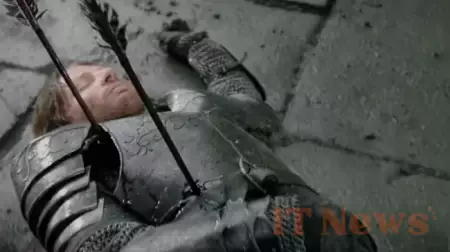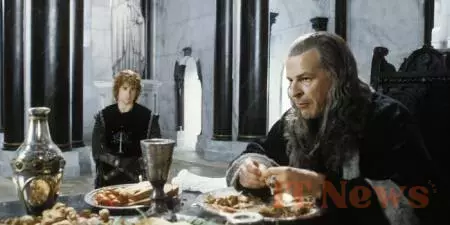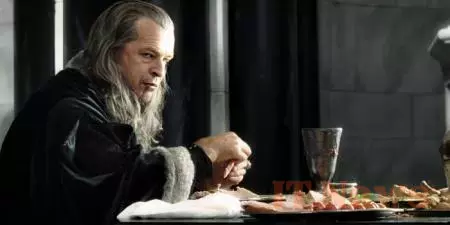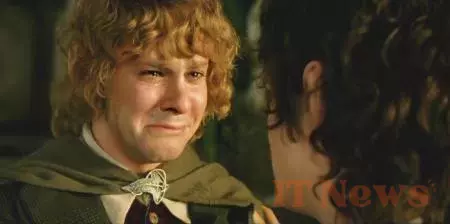The Lord of the Rings trilogy is adventure, heroism, powerful magicians, and repulsive monsters... But it's also a grand spectacle and emotion, capable of melting the viewer's sensitive little heart into a tear as easy as it is discreet. Here's a look back at 10 moments that may have traumatized some people when watching these three great classics.
#10 The Fall of Gandalf
When Gandalf disappears, carried away into the darkness by a gigantic monster of flames, before Frodo's tearful eyes and heartbreaking cries, the spectators' hearts break. The scene is all the more violent because it leaves no time to breathe: the escape continues, tears flow, and Frodo, distraught, must already hit the road again. For those who were discovering The Lord of the Rings without having read the books, this moment was a real electroshock. Until then, despite a few trials, the adventure remained tinged with hope. But then, everything changes. The guide, the wise man, the pillar of the Community falls — and with him, the illusion that the heroes are untouchable. It is at this precise moment that the spectators understand: in Middle-earth, no one is safe. Not even Gandalf.
#9 Boromir's Sacrifice
It is undoubtedly the most brutal death of a hero in the trilogy. At the end of The Fellowship of the Ring, Boromir, consumed by the temptation of the Ring, regains his senses and then attempts to make amends for his evil deeds by sacrificing himself to save Merry and Pippin. Indeed, the two hobbits are threatened with being kidnapped by dozens of over-equipped Uruk-hai, presented until then as a decisive weapon developed by the treacherous white magician Saruman. Boromir initially comes out of it rather well before Lurtz, the leader of the Uruk-hai, appears. Lurtz then fires a super-powerful arrow that pierces poor Boromir. The captain of Gondor remains standing, heroic and bloodied, refusing to fall while he can still protect someone. From there, the arrows multiply, his agony, long and poignant, becomes visually painful. Worse, his sacrifice is useless since Merry and Pippin are kidnapped with heart-rending screams and under the now helpless gaze of Boromir. (more details here). Carried away by his horse into an icy river, unconscious and bloody, the hero who has been carrying the entire group since the beginning of the film seems truly lost. The cold and silent staging accentuates this anguish. The shock in Legolas's eyes, Gimli's pain, the despair that grips the troops, and everything leads to the belief that Aragorn has perished. This false farewell—all too credible—traumatizes an audience already scarred by Boromir's death, and who say to themselves, at that moment, that decidedly, each episode seems doomed to sacrifice a crucial character.
The heroic arrival of the Rohan reinforcements in The Return of the King is already a magnificent moment in itself. The distant sound of the horn echoing, the sun rising behind the riders, and the music building in intensity are clearly designed to thrill the viewer. But when you understand that most of the riders are launching a near-kamikaze charge against a far larger enemy, equipped with formidable weapons like the Oliphants and led by the terrifying Witch-king of Angmar, everything takes on another dimension. Peter Jackson is clever enough to show the stakes through the eyes of Éowyn and Merry, hidden among the rank and file. Their tight throats and palpable fear reflect the harsh reality: they are entering a battle where survival is far from guaranteed. This humanity in the face of horror intensifies the emotional impact of this epic scene. Faced with the devastation of the ancient forests, the face of this being, created in animatronics, suddenly expresses a strange mixture of deep sadness and immense anger. This awakening of the sacred nature of Middle-earth marks a turning point: the Ents, until now peaceful guardians of the woods, are transformed into destructive forces. When Treebeard launches the last march of the Ents on Isengard, the raw power of nature reasserts itself, offering spectators a grandiose and hopeful spectacle. If the ecological and environmental cause touches you even a little, this epic fight suddenly resonates like a symbolic revenge, and thrills the hearts of an audience galvanized by this epic battle.
#5 Sam's 42nd speech
Sam's very first monologue to remotivate his mister Frodo has its little effect — a real moment of hope and sweetness at the heart of the adventure. But very quickly, Sam becomes a real speech machine: whiny, definitive, and sometimes a bit endless about life, death, destiny, and even the pints of Shire ale. At the end of The Return of the King, it's simple, even in the short version, we regularly want to send the Ring as quickly as possible to the heart of Mordor, just to put an end to these long, tearful monologues that seem never to end. It's a good thing the eagles arrived to retrieve Frodo and shorten the return journey, because repeating the exact same route with such an emphatic speech machine would have seriously toughed out Frodo's nerves... and even the most patient spectators'!
#4 Sam the porter
Even if Sam has sometimes been gently mocked for being a bit too Manichean, it is impossible to deny that his gesture in the last minutes of the quest, in The Return of the King, is a pure cinematic moment. As Frodo lies completely exhausted and at the end of his rope on the slopes of Mount Doom, Sam refuses to let him fall. He utters the now iconic phrase: "I cannot carry the Ring for you... but I can carry you." Sam then lifts Frodo onto his shoulders and carries him almost to the top. Howard Shore's music escalates, and this emotional crescendo literally melts the tear ducts of even the most hardened spectators. A truly graceful moment.
Although often used as a simple narrative stopgap, Faramir still has his moment of grace, as epic as it is tragic, in The Return of the King. It is in this episode that, to gain his father's approval, Faramir attempts to reconquer the city of Osgiliath invaded by orcs and Nazgûl. Faramir then leads a half-heroic, half-suicidal charge, punctuated by a particularly melancholic song, sung by a tearful Pippin who knows his colleague is heading for almost certain death.
Galloping towards death in slow motion, empty stare, depressing music and cruel smiles from the orc archers: when the first arrows finally hit their targets, it is the little hearts of the crying fans that they impact. But if the Faramir part remains a shock for fans, it is nothing compared to the other half of this scene which we talk about right after...
#2 Denethor's Dinner
Alongside Faramir's suicidal charge, Peter Jackson inflicts on us a scene just as brutal, psychologically speaking. While Faramir rushes towards almost certain death, his father Denethor is having lunch. The lord of Minas Tirith gulps down a lavish banquet, without the slightest elegance, chewing with his mouth full like a starving ogre, under the tearful gaze of a Pippin forced to sing to distract him. Between mouthfuls of dripping meat, Denethor watches his singing hobbit like a sad wallpaper, while his people are under siege and his son is about to end up as target practice for orcs.
Finally, it's when he starts to crunch cherry tomatoes, the juice of which spreads like a stream of blood, that we understand that his son has just been seriously injured. At that moment, Denethor no longer eats: he symbolically devours his own children, like a Tolkienian Chronos. Finally, the last trauma for fussy viewers: the presence of cherry tomatoes, a fruit developed in the 17th century by a Swiss botanist, from tomatoes discovered in Mexico after the 16th century... Suffice to say that it looks a bit out of place in a medieval fantasy world.
#1 Frodo's Departure
Frodo's final departure, choosing to leave Middle-earth where he no longer feels at home, is a real heartbreak. After seeing the Fellowship slowly disintegrate, viewers understand that the adventure is well and truly over. This departure becomes a symbolic death: a farewell to the epic, the acceptance of a return to normal life, often difficult to manage. Those who remain, including the spectators, will now grow old and face life without the Ring or magical powers.
And to learn more about adaptations of Tolkien's universe, discover why the Lord of the Rings trilogy owes everything to Peter Jackson's talent.






0 Comments